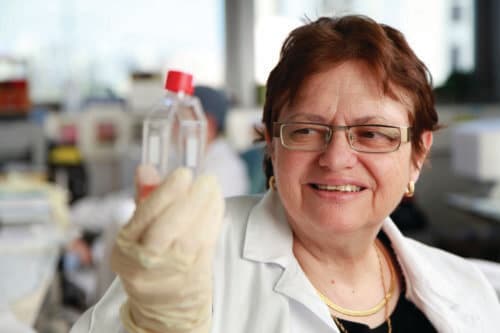The new RNA, of a non-coding type, was discovered in research in the laboratory of Prof. Shulamit Michaeli at Bar-Ilan University. A breakthrough that may contribute to the development of new drugs * The vaccine successfully developed against the corona virus will lead to the development of RNA-based drugs

Prof. Shulamit Michaeli, Vice President for Research and researcher at the Faculty of Life Sciences of Bar-Ilan University found a new type of RNA that was not known to science until now. The RNA is found in the cells of the trypanosome parasite that causes sleeping sickness. The rare discovery may contribute to the development of new drugs.
The name of the genetic material RNA has become common during the Corona period since one of its types, mRNA (messenger RNA), is the active ingredient in the Corona vaccine. In recent years, even before the pandemic, scientific interest in RNA has increased over its various types and the new discovery is a very significant addition to existing knowledge.
To understand the importance of the discovery that emerged in Prof. Michaeli's laboratory, one must first understand what RNA is and what its functions are. The genetic information, according to which the proteins that determine all our hereditary traits are coded, will be stored on DNA molecules. DNA is "locked" inside the almost impenetrable cell nucleus, and thus one of the important functions of RNA is to carry copies of information from the DNA outside the cell nucleus so that the ribosome translates the code that RNA (in this case mRNA) carries for protein production. The ribosome itself is also made of RNA, this time a non-coding one. In addition to these functions, RNA plays a role in DNA replication and control of processes in the cell.
In recent years it has been found that RNA, which is known as non-coding, is very important. Such RNA molecules control mRNA activity and determine whether it will survive or be broken down, whether it will be translated into a protein or whether its translation will be inhibited. Prof. Michaeli's research group discovered new non-coding RNA (ncRNA) molecules. What is innovative about the new ncRNA molecules is that they originate from the gene that codes for rRNA. rRNA undergoes processing in the cell, during which non-essential regions are found. To date, no role has been found for the RNA "pieces" found during processing. In the research it was found that the "pieces" give birth to ncRNA molecules. After ncRNA is formed, it contacts another region of the ribosome and goes out with it from the nucleus to the cytoplasm of the cell, where the protein synthesis is carried out.
Being on the ribosome, ncRNA controls the translation process of a defined group of mRNA molecules. The researchers wondered about the origin of the molecules controlled by the new type of RNA. For this purpose, they developed a method based on "Tell me who your friend is and I'll tell you who you are," which, translated to chemistry, "will identify you through the molecules that connect to you." With the help of ultraviolet radiation one molecule is bound to another and then the bound molecules are connected to each other and the sequence of the "connected" molecule is identified. This method can be applied in any cell and may teach us about the unknown role of the ncRNA-type molecules.
The new ncRNA molecules were discovered in the parasite that causes sleeping sickness in humans, and they belong to the Antisense RNA family, a type of non-coding RNA whose role is to inhibit the translation of mRNA into protein. Here we are dealing with antisense RNA molecules of a new type, which have not yet been found in any creature on earth.
Prof. Michaeli, Bar-Ilan's vice president for research and a researcher in the Faculty of Life Sciences, explained the potential practical contribution of the discovery: "Unique genes found in the parasite and not in the host are a source of hope for the development of RNA-based drugs against these parasites and their relatives such as the Leishmania parasite that is common in Israel and causes ringworm Jericho. With the development of the technology to insert RNA molecules into cells, as we see in the corona vaccine, the technology to use RNA as a medicine has risen, which is expected to grow in the coming years for other purposes besides the vaccine. This molecule saves lives and has a great future."
More of the topic in Hayadan:
